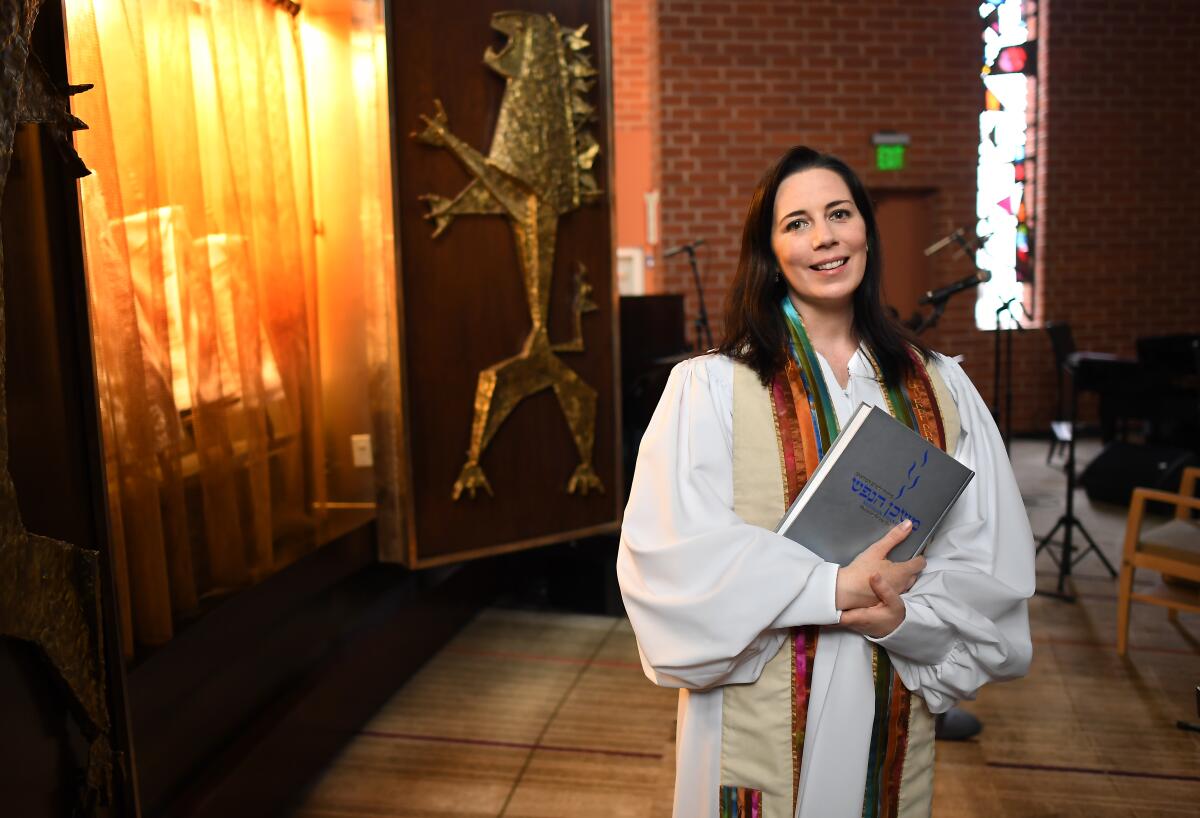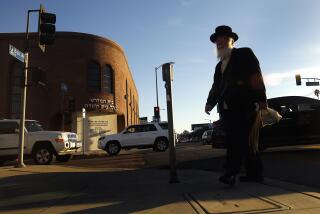‘None of us are prophets’: After a turbulent year, L.A. rabbis wrestle with the politics of faith

For close to a month, Rabbi Yedidia Shofet of Nessah Synagogue in Beverly Hills has prayed to be heard.
It’s a plea Jews make to God every year, one repeated by leaders and laymen of every ethnicity and denomination in predawn services ahead of Rosh Hashana and Yom Kippur.
Yet, after a year of deadly synagogue shootings, violent hate crimes and presidential tweets calling the majority of Jewish voters “very disloyal,” few of their leaders can agree what to say.
“People love to say, ‘Talk about politics,’ but none of us are prophets — it’s not our job,” Shofet said. “It takes away from the Torah, from our direct understanding. We have to understand that the only one we can turn to for protection is not government, it’s [God].”
But many disagree, and not merely among the more liberal denominations. The new year and the Day of Atonement are by far the best-attended observances of the religious year, and with most traditional prayers recited in Aramaic and Hebrew, the rabbi’s speech is the only part of the hours-long service that many worshipers will understand.
Whether and how to address politics from the pulpit has split synagogues across Los Angeles, baring rifts that transcend denomination and defy common wisdom about a community often seen as politically monolithic, or at the very least ideologically segregated.
Several prominent local leaders said that condemning child separation or inveighing against AR-15s was an abuse of rabbinical power. Others called the failure to do so “a heresy.”
“From the outside, people look at California as a whole, at Los Angeles, and at Jewish Los Angeles in particular as hyper-liberal,” said Rabbi Ken Chasen of Leo Baeck Temple in Bel-Air. “But very few congregations would say they don’t have a meaningful mixture” of liberal and conservative members.
That mixture makes local synagogues a rare neutral zone in American public life, whether they affiliate with Orthodox, Conservative or Reform Judaism.
“It’s a kind of model for American society that people with very different views can sit in the same room and talk to each other,” said Rabbi David Wolpe of Sinai Temple in Westwood, who wrote an essay for Time decrying President Trump’s use of anti-Semitic tropes to paint American Jews who vote Democrat as “very disloyal” on Twitter.
Almost 80% of American Jews who cast ballots in the 2018 midterm election voted for Democrats, according to a CNN exit poll.
But the pluralism Wolpe and others see in their pews reflects demographic nuances not captured in national polls, said Raphael Sonenshein, executive director of the Pat Brown Institute for Public Affairs at Cal State L.A., whose survey of Los Angeles County Jewish voters will be released next week.
Those differences often come to a head in the holy month of Tishrei — which begins with the new year, reaches its apex on the Day of Atonement and ends in the exuberant public completion of the reading of the Torah — when every seat in every sanctuary is full.
“The polarization in the community is so brutal and so cruel; it cuts across all the lines, even in the Orthodox community,” said Rabbi Ed Feinstein of the Conservative synagogue Valley Beth Shalom in Encino.
“We’re all caught between two poles: On the one hand, we are culturally alive, politically alive people; on the other hand, those of us who have heterogeneous congregations want to preserve our own communities,” said Feinstein, who sparked outrage last year when he called Trump’s rhetoric a threat to American democracy.
L.A.’s Jewish diversity complicates the picture, experts say. Huge numbers of Jewish Angelenos come from places like Tehran, Baghdad, Jerusalem and Odessa, Ukraine, where religious life is radically different from in the U.S., and most live cheek by jowl with those who were born in Brooklyn or Long Beach, on the same blocks and in the same apartment buildings.
In Pico-Robertson, a single eight-unit apartment building might house three Jewish families who speak five different languages, send their children to four different religious schools, worship regularly at six different synagogues and still eat all together on the Sabbath.
“One of the things I learned from my experiences [speaking about politics] was it’s just wrong for the rabbi to cause people to feel like strangers in their own synagogue,” said Rabbi Yosef Kanefsky of B’nai David-Judea Congregation in Pico-Robertson, an Orthodox synagogue whose positions on LGBTQ inclusion and female leadership put it at the movement’s leftmost flank. “When I want to talk about specific policy — and this has been the case in regard to immigration in particular — I don’t do it from the pulpit.”
Instead, Kanefsky led a group of congregants to the U.S.–Mexico border to meet asylum seekers being released from immigration detention in January and started an educational forum on politically charged topics after Saturday morning prayers.
“We only talk about the downside of speaking about politics, but there is an upside,” said Rabbi Sarah Bassin of Temple Emanuel of Beverly Hills, a Reform synagogue that has started a similar series on political issues. “The voices people hear within the synagogue community are … already part of the establishment. The voices that aren’t heard are the people who are hungry” for political engagement.
Bassin and others pointed to the success of Mid-City’s Ikar — which means “the gist” or “the essence” in Hebrew — an explicitly activist “post-denominational” congregation that counts Mayor Eric Garcetti among its members, as evidence that many are seeking a more direct engagement with politics from their spiritual leaders.
“There’s no such thing as decoupling religion and politics,” Ikar Rabbi Sharon Brous said. “It’s a talking point used to silence those who come from the prophetic tradition, people who really believe our tradition calls us to stand with the poor, the vulnerable and the stranger.”
Her words echoed those of the Prophet Isaiah in the fiery passage read every year on Yom Kippur.
Hear our voice, the faithful pray in the days leading up to the fast. Do not cast us away.
If you want God to hear you, let the oppressed go free, the prophet replies. Share your bread with the hungry. Take the poor into your home.
“The prophet says bring the hungry into your house and feed them, don’t wait for God to do it,” said Feinstein, the rabbi at Valley Beth Shalom. “That’s my theology. That’s why I think every now and again when rabbis feel that the issues are so egregious and difficult, they have to speak up.”
Others read the exhortation more literally.
“There’s a saying in the Talmud — say little and do much,” said Rabbi Steve Leder, senior rabbi of the venerable Wilshire Boulevard Temple, who steers clear of politics. “Instead of me issuing proclamations, we’ve built a social services center at one of our campuses where we feed 50,000 people a year, and we provide free vision and dental care for 5,000, and free ESL. That’s my statement.”
Though few L.A. rabbis agree on what to tell their congregants, their congregants have had plenty to say to them.
“There’s always disputes. Active, beautiful, rich discourse and disagreement, but the core principles and core commitments are unifying,” Brous said. Congregants “want and need to be in conversation about what’s happening.”
More to Read
Sign up for Essential California
The most important California stories and recommendations in your inbox every morning.
You may occasionally receive promotional content from the Los Angeles Times.











